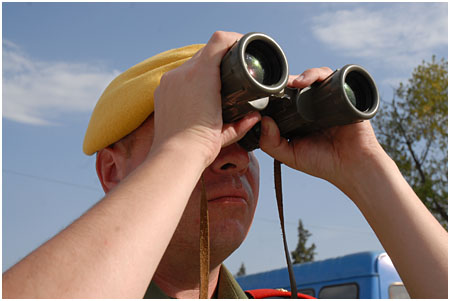
The OSCE’s mission in Georgia, which opened in 1992, is coming to a close. Veronika Oleksyn for AP:
OSCE chair Finland called a meeting Monday morning to seek a three-month extension to the mandate, which expires on Dec. 31, to allow time for more negotiations on the mission’s future. It had been the topic of behind-the-scenes discussions for some time. “Unfortunately, there was no consensus on this decision,” said Antti Turunen, Finland’s ambassador to the OSCE, after the closed-door gathering.
“That means we have to start withdrawal of the mission and cease its activities.” The Vienna-based OSCE operates by consensus, so it takes just one of its 56 members to block a decision.
An OSCE statement said Russia could not accept any linkage between OSCE activities in South Ossetia and those in the rest of Georgia. “All it comes down to … is the insistence of Russia that there has to be recognition of the independence of South Ossetia and Abkhazia in the future structure of the mission,” said Ian Cliff, Britain’s ambassador. Russia recognized the two regions as independent nations after its August war with Georgia. It is the only OSCE country to have done so. Russian envoy Anvar Azimov said the independence of both South Ossetia and Abkhazia was a “reality.”
But U.S. ambassador Julie Finley said Monday’s events were “very serious” for both the region and the OSCE and referred to Russia’s resistance as “appalling.” “In this case there is only one party responsible for what has happened and what is about to happen with the shutting down of that mission — it is the Russian Federation,” Finley said. Georgian Deputy Foreign Minister Giga Bokeria said Russia was challenging not only his country’s sovereignty and independence but also international law and institutions. “It’s basically a statement that the Soviet Union is back,” Bokeria said.
As outrageous as Russia’s actions in invading Georgia and seizing terrority clearly recognized by international law as Georgia’s, Azimov is right. The reality of the matter is that South Ossetia and Abkhazia are no longer part of Georgia and will never be again. The international community — including the UN, the EU, and NATO — simply lacked the stomach to do anything serious about Russia’s action and it’s now a fait accompli.
Nor is Russia’s action here “appalling” or an indication of the return of the Soviet Union. Countries have a right to recognize the independence of other countries and to see who will follow. The United States did that with Israel in 1948 and Germany did it with several of the breakaway Yugoslav republics in 1991. Further, OSCE is a consensus organization and Russia is a member; of course it was going to vote to thwart OSCE actions it believed against her interests. And, frankly, the presence or lack of 200 OSCE monitors really won’t change much.
The question, then, is What now? Does the EU step up its efforts to force Russia to abide by its obligations? Does NATO weigh in? My guess is No, on both counts.
James Joyner is managing editor of the Atlantic Council. Photo by Flickr user onewmphoto under Creative Commons license.
Image: osce-georgia.jpg
